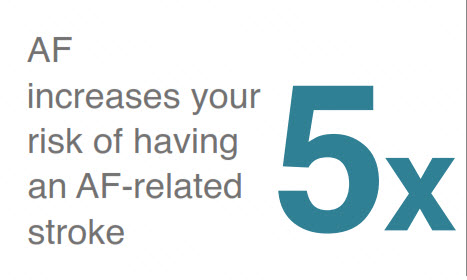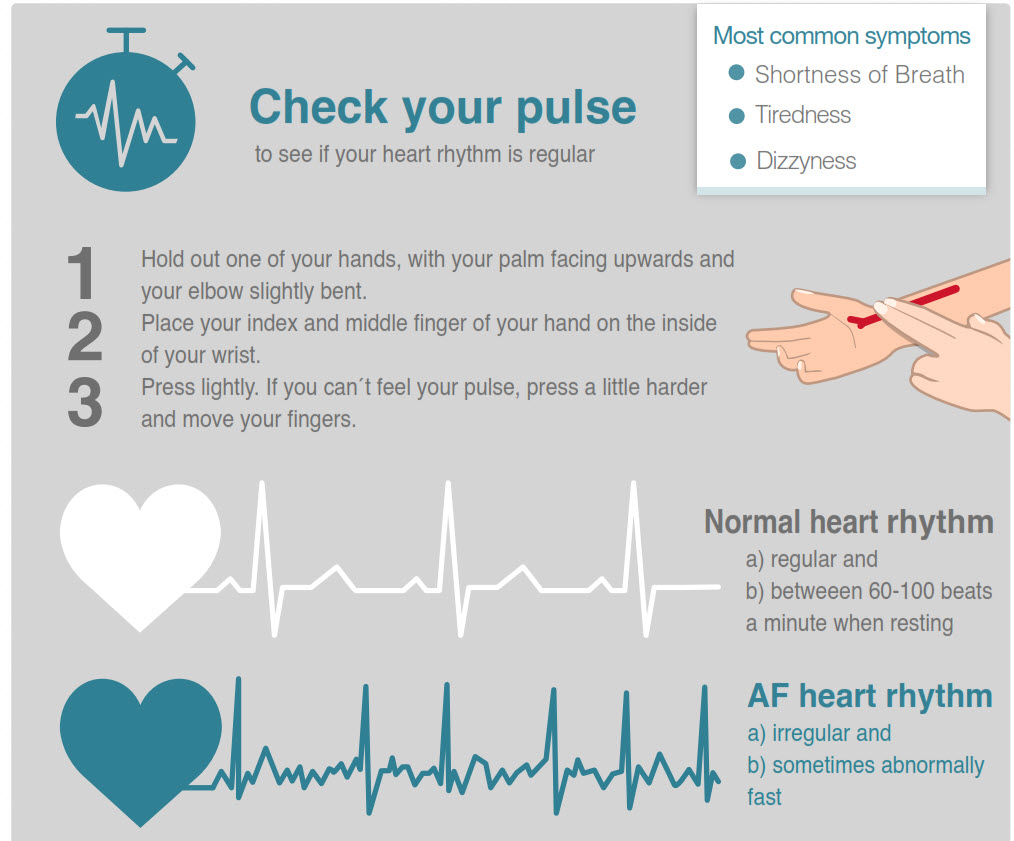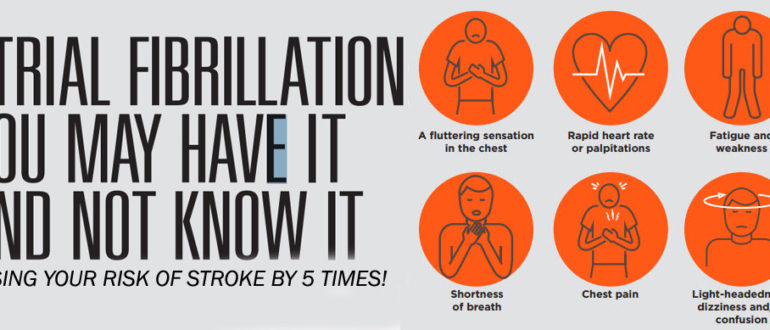Did you know that Atrial Fibrillation (AF) is a contributing factor in up to 1 in 5 strokes in the UK?
 Given that around 1 in 5 women, and around 1 in 6 men will have a stroke in their life, you really need to be aware and checking up on this.
Given that around 1 in 5 women, and around 1 in 6 men will have a stroke in their life, you really need to be aware and checking up on this.
If you have an irregular pulse it could be a sign that you have an abnormal heart rhythm. AF is one of the most common forms of abnormal heart rhythm and a major cause of stroke.
AF might not be bad on its own, but it keeps bad company. Many people tend not to realise that AF is one of the largest risk factors for major strokes, and it can cause congestive heart failure and other cardiac diseases.
AF increases stroke risk by around four to five times because it increases the risk of a blood clot forming inside the heart. If the clot travels to the brain, it can lead to a stroke.

The good news is that with appropriate treatment the risk of stroke can be substantially reduced.
Understanding, recognising and taking proactive measures against AF can potentially save your life.

Part of what makes atrial fibrillation so dangerous is that many people with the disease may experience mild, negligible symptoms, or even none at all.
Your heart’s pumping action is controlled by tiny electrical messages produced by a part of the heart called the sinus node (sino-atrial node). The sinus node is sometimes called your heart’s ‘natural pacemaker’. Normally, the electrical messages are sent out regularly, with each message telling your heart to contract and pump blood around your body.
This is felt as a normal, regular heartbeat, or pulse felt at the wrist.
In the case of a very fast or irregular fast-beat, go and see a Doctor ASAP!
IMPORTANT: Diagnosing AF is usually a fairly simple process that includes a Doctor’s exam and an electrocardiogram (EKG). If AF is detected, your doctor may want to do follow-up tests and blood work to ensure there are no other underlying diseases such as high blood pressure.
Atrial fibrillation happens because, as well as the sinus node sending out regular electrical impulses, different places in and around the atria (the upper chambers of the heart) also produce electrical messages, in an uncoordinated way. These multiple, irregular messages make the atria quiver or twitch, which is known as fibrillation. This is felt as an irregular and sometimes fast heartbeat, or pulse.
By the way, if you’re wondering, genetics, other cardiac diseases, diabetes, obesity, smoking, sleep apnea, lung disorders, hormonal disorders and excessive alcohol consumption are all potential risk factors as well.
There is currently no cure for AF and the way it is treated is individualised to the patient’s needs. It may involve medication (both to prevent a stroke and to control the heart rate or rhythm) such as anticoagulant (blood thinning) drugs like warfarin or a newer type of drugs called NOACs., cardioversion (when the heart is given a controlled electric shock with the aim of restoring a normal rhythm) and catheter ablation (this works by scarring or destroying tissue in the heart that triggers the AF). Having a pacemaker fitted to help the heart beat regularly may also be an option for some people.
With grateful thanks to the Heart Rhythm Alliance, in partnership with MyTherapy.




2 Comments
Hi. AF was contributing factor for my stroke @47 years. At that time I was running every other day and the AF was experienced as feeling weird, only spotted once by GP’s ecg, despite many hospital admissions, it was missed.
Tom
Atrial Fribullation.
I thought that because my father had it, and now I found my brother has it, and they have both had pacemakers, I thought that I might have it. They put me through a week’s testing and said I don’t, but I have had a Stroke 15 yrs ago, and have none of the usual things that you are supposed to get, except stress! But maybe I do have it, but it is very occasional. I have very low blood pressure and do have feinting fits, which I have had since I was 9, which is a basis of Stroke so you say.
Maybe I’m right?
Yours Jackie Dee